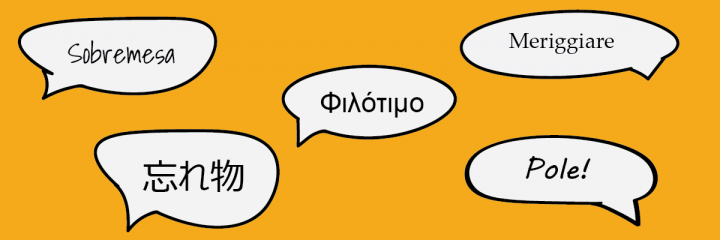Share your words
Introduce us to a word in your language (other than English) and help us showcase the linguistic diversity of our alumni. It could even appear in the next Edit magazine.

Celebrating linguistic diversity
Edinburgh alumni live in some 180 countries around the world, so using a language other than English is a daily occurrence for many. Perhaps you’re reading this with other webpages open in Greek or Malay, or people chatting around you in Yoruba.
In the next edition of Edit magazine, we’d like to highlight some of the languages spoken by our alumni. We’re asking you to submit a word in a language other than English that does not have a direct English equivalent. The word could describe a very specific phenomenon or convey a more nuanced look at a common concept.
To get you thinking, we asked colleagues to share some examples.
Sobremesa (Spanish)
It’s not a surprise that Spanish language has plenty of words around the concept of food and eating! One of these is ‘sobremesa’ and refers to the conversation that takes place after having a good meal with friends or family. Such conversation will happen ‘sobre la mesa’ (over the table) and it can last several hours. It is basically the time spent in conversation, digesting, relaxing, enjoying. Certainly not rushing. For Spaniards, how we eat is as important as what we eat!
Suggested by Sara Mediavilla, Philanthropy Assistant, Legacies and Grants.
忘れ物 - wasuremono (Japanese)
'忘れ物' is a lost article, a forgotten thing, something left behind on the train or at home, for example. During my year abroad in Japan, I used this word all the time (mainly because I ended up leaving things on the train a lot…)
Suggested by Kerry Balkwill, 2016 Japanese graduate and Alumni Relations Projects Officer.
Pole (Swahili)
‘Pole’ would roughly translate to ‘sorry’ in English. It is used when you have caused some minor inconvenience to someone, like accidentally bumping into them. But more than that, it is used to show empathy or sympathy following bad news. If someone says they’re not feeling well, that that they’ve had a hard day at work, or didn’t get to see their family over the holidays, the response to all these scenarios would simply be ‘pole’.
Suggested by Albert Mkony, Senior Tutor in the School of Social and Political Science and a PhD student.
Meriggiare (Italian)
'Meriggiare', from latin ‘meridiare’, means to rest at noon, on a very hot day, preferably in the shade. It is not used orally often, especially by younger generations, but most Italians know the word because it’s the title of a very famous (and beautiful) poem by Eugenio Montale.
Suggested by Chiara Ciucani, Training and Development Officer.
Read the poem 'Meriggiare' (external link)
Φιλότιμο - filotimo (Greek)
'Φιλότιμο' is the sense of having honour, doing the right thing no matter what the circumstances, and being humble and honest.
Suggested by Eleana Kazakeou, Projects and Policy Officer.
How to take part
To participate, please read the guidelines and send an email with the information below to the Alumni team by Monday 25 March 2019.
Guidelines
- You can enter as many words as you wish.
- We may edit the submission for publication purposes.
- Your entry may be used in Edit magazine and published online. We will update you of our intentions.
- The choice for publication in Edit magazine is taken by the editor.
- Your name and degree details will be published with your submission.
- The whole submission, comprising the information below, should be a maximum of 85 to 100 words.
Information to include
- Your chosen word and the language it comes from
- The word’s meaning
- How the word is used in context, including an example sentence and translation in English
- Your name, degree title and year of graduation
Email your suggestions to alumni@ed.ac.uk using the subject line ‘Your words submission’.

